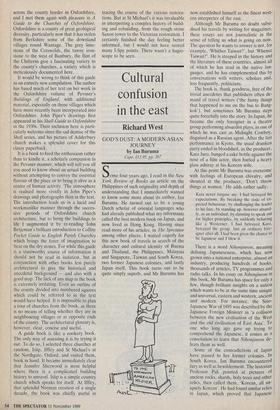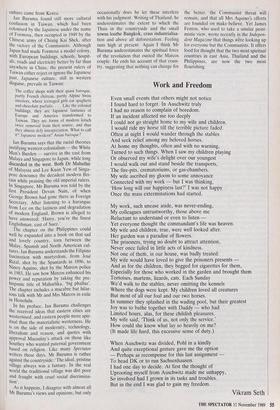Cultural confusion in the east
Richard West
GOD'S DUST: A MODERN ASIAN JOURNEY by Ian Buruma
Cape, £12.95, pp. 267
Some four years ago, I read in the New York Review of Books an article on the Philippines of such originality and depth of understanding that I immediately wanted to know some more about its author, Ian Buruma. He turned out to be a young Dutch scholar of oriental languages who had already published what my informants called the best modern book on Japan, and now lived in Hong Kong. Having since read more of his articles, in The Spectator among other places, I waited eagerly for this new book of travels in search of the character and cultural identity of Burma and Thailand, the Philippines, Malaysia and Singapore, Taiwan and South Korea, two former Japanese colonies, and lastly Japan itself. This book turns out to be quite simply superb, and Mr Buruma has
now established himself as the finest west- ern interpreter of the east.
Although Mr Buruma no doubt subsi- dised his travels by writing for magazines, these essays are not journalistic in the sense of telling us what is going on now. The question he wants to answer is not, for example, 'Whither Taiwan?', but 'Whence Taiwan?'. He is steeped in the history and the literature of these countries, almost all of which he has read in the native lan- guages, and he has complemented this by conversations with writers, scholars and, less frequently, politicians.
The book is, thank goodness, free of the trivial anecdotes that publishers often de- mand of travel writers (`the funny things that happened to me on the bus to Bang- kok'), but sometimes Mr Buruma steps quite forcefully into the story. In Japan, he became the only foreigner in a theatre group performing absurdist plays, in one of which he was cast as Midnight Cowboy, disguised as a Russian agent. After the last performance in Kyoto, the usual drunken party ended in bloodshed, as the producer, Kara Juro, banged a sake bottle against the nose of a film actor, then hurled a heavy glass ashtray at his Korean wife.
At this point Mr Buruma was overcome with feelings of European chivalry, and shouted at the producer, 'Don't throw things at women.' He adds rather sadly:
Kara never forgave me. I had betrayed his expectations. By breaking the code of ex- pected behaviour, by challenging the leader to his face, by standing up, however absurd- ly, as an individual, by claiming to speak out for higher principles, by suddenly behaving like a Westerner, I had betrayed Kara, betrayed the group. Just an ordinary fore- igner after all. I had been given the chance to be Japanese and I blew it.
There is a word Nihonjinron, meaning defining Japaneseness, which has now grown into a national enterprise, almost an industry, producing hundreds of books. thousands of articles, TV programmes and radio talks. In his essay on Nihonjinron in this book, Mr Buruma has space for only a few, though brilliant insights on a nation which wants to be at the same time unique and universal, eastern and western, ancient and modern. For instance, the Sino- Japanese War of 1895 was described by the Japanese Foreign Minister as 'a collision between the new civilisation of the West and the old civilisation of East Asia'. To one who long ago gave up trying to comprehend the Japanese, it comes as a consolation to learn that Nihonjinron de- feats them as well.
Some of the contradictions of Japan have passed to her former colonies. In South Korea, Ian Buruma encountered fury as well as bewilderment. The historian Professor Pak pointed at pictures of ancient rocks, shards, holy trees and other relics, then called them, 'Korean, all un- iquely Korean'. He had found similar relics in Japan, which proved that Japanese
culture came from Korea.
Ian Buruma found still more cultural confusion in Taiwan, which had been colonised by the Japanese under the name of Formosa, then occupied in 1949 by the Chinese army of Chiang Kai Shek, after the victory of the Communists. Although Japan had made Formosa a model colony, with European buildings, schools, hospit- als, roads and electricity better by far than anywhere in China, the present rulers of Taiwan either reject or ignore the Japanese past. Japanese culture, still in western disguise, prevails in Taiwan:
The coffee shops with their quasi baroque, partly French chateau, partly Alpine Swiss interiors, where teenaged girls eat spaghetti and chocolate parfaits. . . Like the colonial buildings, they are Japanese fantasies of Europe and America transformed to Taiwan. They are forms of modern kitsch twice removed from their source, and thus they almost defy interpretation. What to call n? Japanese modern? Asian baroque?
Ian Buruma says that the racial theories Justifying western colonialism — the White Man's Burden — survive in the east from Malaya and Singapore to Japan, while long discarded in the west. Both Dr Mahathir of Malaysia and Lee Kuan Yew of Singa- pore denounce the decadent modern Bri- tain while praising the old imperial rulers. In Singapore, Mr Buruma was told by the first President Devan Nain, of when George Brown had gone there as Foreign Secretary. After listening to a harangue from. Lee on the laziness and degradation of modern England, Brown is alleged to have answered: 'Harry, you're the finest Englishman, east of Suez.'
The chapter on the Philippines could well be expanded into a book on that sad and lovely country, torn between the Malay, Spanish and North American cul- tures. Ian Buruma understands the Filipino fascination with martyrdom, from Jose Rizal, shot by the Spaniards in 1896, to 1\1 Inoy Aquino, shot by the Marcos police in 1983. He saw how Marcos enhanced his power and reputation by taking the pre- hispanic title of Maharlika, 'big phallus'. The chapter includes a macabre but hilar- ious talk with Mr and Mrs Marcos in exile in Honolulu.
In his preface, Ian l3uruma challenges the received ideas that eastern cities are westernised, and eastern people more spir- itual than the materialistic westerners. He Is on the side of modernity, technology, liberalism and reason, and quotes with approval Macaulay's attack on those like Southey who wanted paternal government based on religion. Like many Spectator writers these days, Mr Buruma is rather against the countryside: 'The ideal, pristine village always was a fantasy. In the real world the traditional village was dirt poor and fraught with cruel social discrimina- tion'.
As it happens, I disagree with almost all Mr Buruma's views and opinions, but only
occasionally does he let these interfere with his judgment. Writing of Thailand, he underestimates the extent to which the Thais in the countryside and the small towns loathe Bangkok, crass industrialisa- tion and above all deforestation. Feeling runs high at present. Again I think Mr Buruma underestimates the spiritual force of the revolution that ousted the Marcos couple. He ends his account of that coun- try, suggesting that nothing can change for the better, the Communist threat will remain, and that all Mrs Aquino's efforts are founded on make-believe. Yet James Fenton, who used to take a similar pessi- mistic view, wrote recently in the Indepen- dent Magazine that things were looking up for everyone but the Communists. It offers food for thought that the two most spiritual countries in east Asia, Thailand and the Philippines, are now the two most flourishing.











































































 Previous page
Previous page